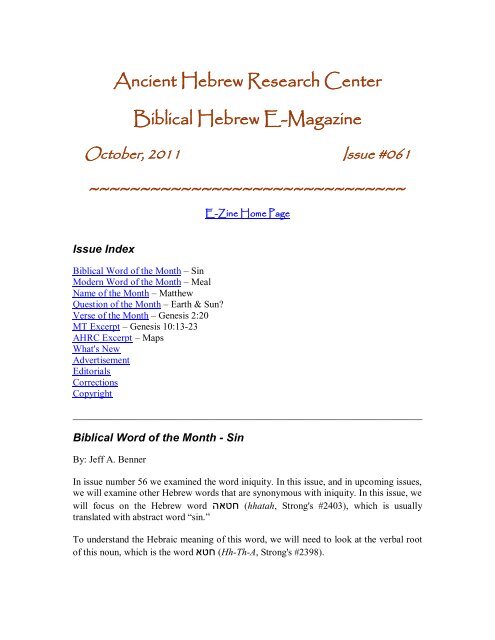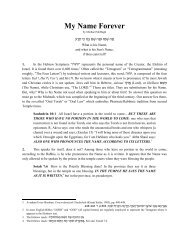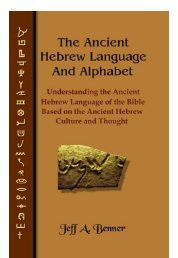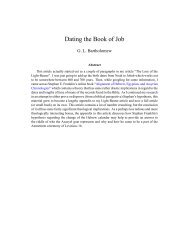Biblical Hebrew E-Magazine - Ancient Hebrew Research Center
Biblical Hebrew E-Magazine - Ancient Hebrew Research Center
Biblical Hebrew E-Magazine - Ancient Hebrew Research Center
Create successful ePaper yourself
Turn your PDF publications into a flip-book with our unique Google optimized e-Paper software.
<strong>Ancient</strong> <strong>Hebrew</strong> <strong>Research</strong> <strong>Center</strong><br />
<strong>Biblical</strong> <strong>Hebrew</strong> E-<strong>Magazine</strong><br />
October, 2011 Issue #061<br />
~~~~~~~~~~~~~~~~~~~~~~~~~~~~~~~<br />
Issue Index<br />
<strong>Biblical</strong> Word of the Month – Sin<br />
Modern Word of the Month – Meal<br />
Name of the Month – Matthew<br />
Question of the Month – Earth & Sun?<br />
Verse of the Month – Genesis 2:20<br />
MT Excerpt – Genesis 10:13-23<br />
AHRC Excerpt – Maps<br />
What's New<br />
Advertisement<br />
Editorials<br />
Corrections<br />
Copyright<br />
E-Zine Home Page<br />
________________________________________________________________________<br />
<strong>Biblical</strong> Word of the Month - Sin<br />
By: Jeff A. Benner<br />
In issue number 56 we examined the word iniquity. In this issue, and in upcoming issues,<br />
we will examine other <strong>Hebrew</strong> words that are synonymous with iniquity. In this issue, we<br />
will focus on the <strong>Hebrew</strong> word האטח (hhatah, Strong's #2403), which is usually<br />
translated with abstract word “sin.”<br />
To understand the Hebraic meaning of this word, we will need to look at the verbal root<br />
of this noun, which is the word אטח (Hh-Th-A, Strong's #2398).
<strong>Biblical</strong> <strong>Hebrew</strong> E-<strong>Magazine</strong><br />
Among all this people there were seven hundred chosen men lefthanded;<br />
every one could sling stones at a hair-breadth, and not miss. (ASV,<br />
Judges 20:16)<br />
The word “miss” in this passage is the <strong>Hebrew</strong> verb אטח and literally means, to<br />
“miss the mark,” to miss what you are aiming at. Yahweh gave his Torah<br />
(teachings) to his people and Torah was their mark, their target.<br />
The noun האטח (hhatah, Strong's #2403), derived from the verb אטח (Hh-Th-A,<br />
Strong's #2398) is an error. When you shoot your arrow at the target and miss,<br />
you have made an error. When we aim to hit the target of God’s teachings, but<br />
miss that target, we make an error.<br />
________________________________________________________________________<br />
Modern Word of the Month - Meal<br />
By: Jeff A. Benner<br />
The <strong>Hebrew</strong> word החורא (arohhah, Strong's #737) is both a <strong>Biblical</strong> <strong>Hebrew</strong> word and a<br />
Modern <strong>Hebrew</strong> word meaning “meal,” a time of eating. In Modern <strong>Hebrew</strong>, the word<br />
for breakfast is רקוב החורא (arohhah boqer), meaning “morning meal.” החורא<br />
םיירהצ (arohhah tsaharayim) is the “noon meal.” And ברע החורא (arohhah erev) is<br />
the “evening meal.”<br />
________________________________________________________________________<br />
Name of the Month - Matthew<br />
By: Jeff A. Benner<br />
And as Jesus passed forth from thence, he saw a man, named Matthew,<br />
sitting at the receipt of custom: and he saith unto him, Follow me. And he<br />
arose, and followed him. (KJV, Matthew 9:9)<br />
The name Matthew is a <strong>Hebrew</strong> name, and is written in <strong>Hebrew</strong> as היתתמ (matityah).<br />
This name is the <strong>Hebrew</strong> noun תתמ (matat, Strong's #4991) meaning “gift” or “reward,”<br />
and the name הי (Yah, Strong's #3050). Combined, this name means “gift of Yah” or<br />
“reward of Yah.”<br />
2
<strong>Biblical</strong> <strong>Hebrew</strong> E-<strong>Magazine</strong><br />
_______________________________________________________________________<br />
Question of the Month – Earth & Sun?<br />
By: Jeff A. Benner<br />
Q: According to Genesis chapter one, the earth was created before the sun, which is<br />
scientifically impossible. Is this an error in the Bible?<br />
A: Genesis chapter one is not a scientific account of the order of the creation of the<br />
universe, but instead it is a poem and was most likely a song. It is not even meant to be in<br />
chronological order. The <strong>Hebrew</strong>s write in what is called block logic (grouping related<br />
events together). We, a Western people, think in step logic (grouping events together in a<br />
chronological order). If we try to read the Bible as if it was written in step logic we will<br />
miss the intended meanings of the author. I go into detail about Genesis chapter one on<br />
my website and Youtube channel.<br />
Related website articles<br />
http://www.ancient-hebrew.org/23_genesis_1.html<br />
http://www.ancient-hebrew.org/23_chiasmus.html<br />
http://www.ancient-hebrew.org/23_genesis_2.html<br />
Related Videos<br />
http://www.youtube.com/watch?v=juZSxrPOd2k (and several other videos in that series)<br />
http://www.youtube.com/watch?v=LavvpdMPZdw<br />
http://www.youtube.com/watch?v=Z4Eb5HmzJtA<br />
________________________________________________________________________<br />
Verse of the Month – Genesis 2:20<br />
By: Jeff A. Benner<br />
לֹכְלוּ םִּי ַמ ָש ַה ףוֹעְלוּ ה ָמ ֵׁה ְב ַה־לָכְל תוֹמ ֵׁש ם ָדאָ ָה ארָ ְקִּיַו<br />
׃וֹד ְגֶנ ְכ רֶז ֵׁע א ָצ ָמ־אלֹ ם ָדאְָלוּ ה ֶד ָש ַה תַי ַח<br />
And the man gave names to all cattle, and to the birds of the heavens, and to every beast<br />
of the field; but for man there was not found a help meet for him. (ASV)<br />
א ָ<br />
ר ְק ִּיַו (vai-yi-qra)<br />
This verb root is ארק (Q.R.A) meaning "call out" The prefix י (y) identifies the subject of<br />
the verb as third person, masculine singular and the tense of the verb as imperfect - he<br />
will call. The prefix ו (v) means "and,” but also reverses the tense of the verb – and he<br />
called.<br />
3
<strong>Biblical</strong> <strong>Hebrew</strong> E-<strong>Magazine</strong><br />
ם ָדאָ ָה (ha-a-dam)<br />
The base word is םדא (adam) meaning “human.” The prefix הmeans “the” – the human.<br />
תוֹמ ֵׁש (she-mot)<br />
The base word is the noun םש (shem) meaning “name.” The תו (ot) is the feminine plural<br />
suffix - "names."<br />
ל ָכ ְל (le-khol)<br />
The base word is לכ (kol) meaning "all." The prefix ל (le) means to - "to all."<br />
ה ָמ ֵׁה ְב ַה (ha-be-hey-mah)<br />
The base word is המהב behemah meaning “livestock.” The prefix ה (ha) means “the” -<br />
"the livestock."<br />
ףוֹע ְלוּ (ul-oph)<br />
The base word is ףוע (oph) meaning "flyer" (usually a bird). The prefix ל (l) means “to”<br />
or "for" - "to/for the flyer." The prefix ו (u) means “and” - "and to/for the flyer."<br />
םִּי ַמ ָש ַה (ha-sha-ma-yim)<br />
This is the word םימש (shamayim) meaning “skies.” The prefix הmeans “the” – “the<br />
skies.”<br />
לֹכ ְלוּ (ul-khol)<br />
The base word is לכ (kol) meaning "all." The prefix ל (le) means to - "to all." The prefix<br />
ו (u) means and - "and to all."<br />
ה ֶד ָש ַה (ha-sa-deh)<br />
This is the noun הדש (sadey) meaning "field" with the prefix ה (ha) meaning "the" – the<br />
field.<br />
ם ָדאָ ְלוּ (ul-a-dam)<br />
The base word is the noun םדא (adam) meaning "human." The prefix ל (l) means “to” or<br />
"for" - "to/for the human." The prefix ו means "and" – "and to/for the human."<br />
4
<strong>Biblical</strong> <strong>Hebrew</strong> E-<strong>Magazine</strong><br />
אלֹ (lo)<br />
This is the <strong>Hebrew</strong> word meaning “no” or “not.” This word is often placed before a verb<br />
to place the action of that verb in the negative.<br />
א ָצ ָמ (ma-tsa)<br />
The base word is אצמ (M.Ts.A), a verb meaning "to find." The lack of any prefixes or<br />
suffixes identifies the tense of the verb as perfect - found and the subject of the verb as<br />
masculine singular - "he found." The previous word negates the action of the verb – “he<br />
did not find.”<br />
ר ֶז ֵׁע (ey-zer)<br />
This is a word meaning “helper.”<br />
וֹד ְגֶנ ְכ (ke-neg-do)<br />
The base word is the noun דגנ (negad) meaning "face to face," but can be used in a wide<br />
sense including, to be in front or to be opposite. The prefix כ (ke) means “like” and the<br />
suffix ו (o) means "his" – like his opposite.<br />
The following is a literal rendering of this verse from its Hebraic meaning.<br />
And the human called out to all of the livestock and to the flyers of the skies and<br />
to all the living ones of the field, and he did not find a helper like his opposite.<br />
In following issues we will continue with this chapter.<br />
________________________________________________________________________<br />
Mechanical Translation Excerpt - Genesis 10:13-23<br />
13&and “Mitsrayim [Troubles]” had brought forth the ones of “Lud [Birth]” and the ones<br />
of “Anam [Affliction of water]” and the ones of “Lehav [Flame]” and the ones of<br />
“Naphtuhh [Opening]”, 14&and the ones of “Patros [Mouthful of dough]” and the ones of<br />
“Kasluhh [Fortified]”, which the ones of “Peleshet [Immigrant]” went out from there, and<br />
the ones of “Kaphtor [Knob]”, 15&and “Kena'an [Lowered]” had brought forth “Tsidon<br />
[Hunting]” his firstborn and “Hhet [Shattered]”, 16&and the one of “Yevus [He<br />
threshes]” and the one of “Emor [Sayer]” and the one of “Girgash [Stranger on clods]”,<br />
17&and the one of “Hhiw [Village]” and the one of “Araq [Gnawing]” and the one of<br />
“Sin [Thorn]”, 18&and the one of “Arwad [I will preside over]” and the one of “Tsemar<br />
[Woolen]” and the one of “Hhamat [Fortress]” and after the families of the one of<br />
“Kena'an [Lowered]” were scattered abroad, 19&and the border of the one of “Kena'an<br />
[Lowered]” existed from “Tsidon [Hunting]” as you come unto “Gerar [Chew]” as far as<br />
5
<strong>Biblical</strong> <strong>Hebrew</strong> E-<strong>Magazine</strong><br />
“Ghaza [Strong]”, as your coming unto “Sedom [Secret]” and “Ghamorah [Rebellion]”<br />
and “Admah [Red ground]” and “Tseviim [Gazzells]”, as far as “Lesha [Fissure]”,<br />
20&these are the sons of “Hham [Hot]”, to their families to their tongues, in their lands,<br />
in their nations, 21&and to “Shem [Character]” was also brought forth, he is the father of<br />
all of the sons of “Ever [Cross over]”, the brother of “Yaphet [Wonder]” the magnificent,<br />
22&the sons of “Shem [Character]”, “Elam [<strong>Ancient</strong>]” and “Ashur [Step]” and<br />
“Arpakhshad [I will fail the breast]” and “Lud [Birth]” and “Aram [Palace]”, 23&and the<br />
sons of “Aram [Palace]”, “Uts [Counsel]” and “Hhul [Twist]” and “Getar [Fear]” and<br />
“Mash [Drawn out]”,<br />
For details on this new translation see the web site at<br />
http://www.mechanical-translation.org<br />
_______________________________________________________________________<br />
AHRC Website Excerpt – Maps, Aprons and Napkins<br />
Many of our English words come from the <strong>Hebrew</strong> language, for example the words<br />
"map", "napkin" and "apron" actually comes from the same <strong>Hebrew</strong> word "mappa".<br />
Though it has made a few changes over the centuries, the history of these words is easily<br />
traced back to their origins. The <strong>Hebrew</strong> word mappa means "a cloth". Mappa was<br />
adopted by the Latin language for the word "map" because at one time, maps were<br />
written on cloth. Over time the "m" was replaced by an "n", which was very common as<br />
these two letters are sounded with the nose, and became "nappa", a cloth. One type of<br />
cloth was used at the dinner table, a "napkin". Another type of cloth was tied around the<br />
waist to keep the clothes clean, a "napron". The "n" in "napron" eventually swapped<br />
places (a common happening during the formation of words) with the article "a" and<br />
became "an apron".<br />
There are many other words that have their root in the <strong>Hebrew</strong> language. Here are only a<br />
few.<br />
<strong>Hebrew</strong><br />
שיא<br />
לבב<br />
שוב<br />
רב<br />
למג<br />
אוה<br />
Pronunciation<br />
iysh<br />
babel<br />
bush<br />
bar<br />
gamal<br />
hu<br />
6<br />
Translation<br />
Each<br />
Babble<br />
Bashful<br />
Barley<br />
Camel<br />
He
<strong>Biblical</strong> <strong>Hebrew</strong> E-<strong>Magazine</strong><br />
אטיח<br />
לט<br />
ללי<br />
שי<br />
רפכ<br />
דונ<br />
לפנ<br />
ךס<br />
רפס<br />
קס<br />
רבע<br />
רבוע<br />
לוע<br />
דצ<br />
לאק<br />
בק<br />
תיש<br />
רות<br />
hhiyta<br />
tal<br />
yalal<br />
yesh<br />
kaphar<br />
nod<br />
naphal<br />
sak<br />
sepher<br />
saq<br />
ever<br />
orev<br />
evil<br />
tsad<br />
qa'al<br />
qav<br />
shiyt<br />
tur<br />
7<br />
Wheat<br />
Tall<br />
Yell<br />
Yes<br />
Cover<br />
Nod<br />
Fall<br />
Shack<br />
Cipher<br />
Sack<br />
Over<br />
Raven<br />
Evil<br />
Side<br />
Call<br />
Cave<br />
Set<br />
Tour<br />
This article is located on the web site at<br />
http://www.ancient-hebrew.org/36_history.html<br />
________________________________________________________________________<br />
What's New<br />
We are always adding new material to the AHRC and Mechanical Translation websites;<br />
here is what is new on these websites.<br />
New Book - Learn <strong>Hebrew</strong> Volume 2<br />
New Book - Genesis, Zen and Quantum Physics<br />
AHRC helps bring paleo-<strong>Hebrew</strong> to life<br />
Alphabet Chart-Updated
<strong>Biblical</strong> <strong>Hebrew</strong> E-<strong>Magazine</strong><br />
________________________________________________________________________<br />
Advertisements<br />
A Mechanical Translation of the Book of Exodus<br />
by Jeff A. Benner<br />
(NEW)<br />
The Mechanical Translation of the Book of Exodus is the second<br />
book in the Mechanical Translation of the <strong>Hebrew</strong> Bible series<br />
which literally translates the book of Exodus using the "Mechanical<br />
Translation" methodology and philosophy. This new and unique<br />
style of translation will allow a reader who has no background in<br />
<strong>Hebrew</strong> to see the text from an Hebraic perspective, without the<br />
interjection of a translators theological opinions and bias. Because<br />
the translation method identifies the morphology of each <strong>Hebrew</strong><br />
word it is also a tool for those who are learning to read <strong>Biblical</strong><br />
<strong>Hebrew</strong>.<br />
Additional information and ordering details are available<br />
through the bookstore.<br />
(http://www.ancient-hebrew.org/bookstore)<br />
________________________________________________________________________<br />
Editorials<br />
Do you have a comment or personal insight into the articles in this issue of the E-Zine? If<br />
so, let us know.<br />
Izzy sent me this interesting connection between the <strong>Hebrew</strong> word להק and the English<br />
word gather.<br />
"The word להק (qahal) is a large group gathered to one place, as a gathering of<br />
the flock of sheep to the shepherd. This noun is derived from the verbal root להק<br />
(Q.H.L, Strong's #6950) meaning to gather or round-up a flock or group of<br />
people."<br />
One of my own findings is that the ancient heh had a dalet+heh DH or TH sound.<br />
The K-sound of the qof is often a G-sound in other languages. And the sounds of<br />
lamed->nun->resh rotate. Rotating twice is equivalent to rotating once in the<br />
opposite direction.<br />
So, להק (QaHaL) is actually cognate with GaTHeR.<br />
Giving the heh a TH-sound makes ToRaH cognate with TRuTH.<br />
Ciao, Izzy<br />
8
<strong>Biblical</strong> <strong>Hebrew</strong> E-<strong>Magazine</strong><br />
In the last issue I included an article about the Modern <strong>Hebrew</strong> word Sabra. Jerry<br />
Lambert sent me the following explanation that he had received that I thought was very<br />
appropriate.<br />
A Jewish friend and academic colleague told me in 1970, in the Netherlands, that<br />
a Jew is like a sabra fruit in that, on first encounter they appear rough and prickly<br />
on the outside. But once you get to know him he is pleasant, sweet and tasty on<br />
the inside. Therefore they are both called sabras -- the plant and the Jew.<br />
_____________________________________________________________________<br />
Corrections<br />
Did you find any errors needing correction in the articles in this issue of the E-Zine? If<br />
so, let us know.<br />
_____________________________________________________________________<br />
Copyright © 2011<br />
Jeff A. Benner<br />
<strong>Ancient</strong> <strong>Hebrew</strong> <strong>Research</strong> <strong>Center</strong><br />
Please feel free to use, copy or distribute any material within the "<strong>Biblical</strong> <strong>Hebrew</strong> E-<strong>Magazine</strong>" for nonprofit<br />
educational purposes only.<br />
________________________________________________________________________<br />
9






